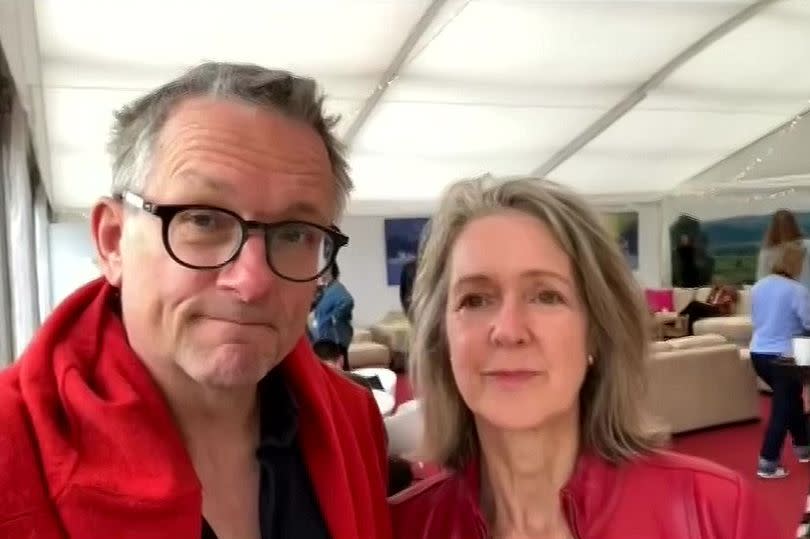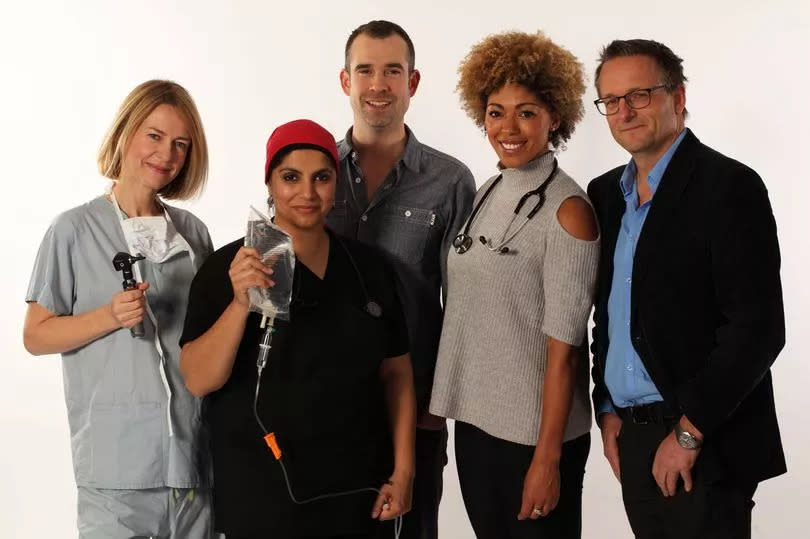Michael Mosley fans in tears as BBC airs last recorded interview with heartbreaking opening

Dr Michael Mosley's poignant final broadcast touched hearts on Radio 4, as the introduction by his friend left listeners deeply moved when they heard: "I didn't know it would be the last time I would see him."
The nation mourns the untimely loss of the popular TV figure and dietary expert, age 67, who met with a tragic end while vacationing with his spouse Dr Clare Bailey on Symi. Dr Mosley vanished after embarking on an afternoon stroll at 1.30pm on Wednesday June 5, only to be found later close to Agia Marina beach on Sunday.
Audiences were graced with Dr Mosleys familiar voice in a special feature entitled There's Only One Michael Mosley presented on BBC Radio 4 and also available on BBC Sounds at 11am Friday June 14, as part of BBC's homage to him. He had presented a unique segment of Just One Thing, his series where he shared actionable health advice, during the Hay Festival on May 25.
READ MORE: Dr Michael Mosley's poignant action before he died is revealed
READ MORE: Greek coroner shares theory on 'exhausted' Dr Michael Mosley's cause of death in Symi
This recording was introduced by Chris van Tulleken, another TV physician who collaborated with Mosley on the BBC series Trust Me, I'm A Doctor.
Chris introduced the show: "What you're about to hear was recorded a few minutes before I met up with Michael at the Hay Festival and what I didn't know was that it would be the last time I ever saw him. Because two weeks later he died on holiday with his wife in Greece.", reports the Mirror.
"As you're listening to Michael, I want you to reflect on his style - dryly witty, modest, humble. This style disguises that he is one of the most important broadcasters of recent decades. Before Michael, doctors in white coats told you how to live from their ivory towers. Michael's genius was to make himself the patient and the guinea pig in a way that's utterly relatable."
"Off-camera and off-mic he was the same - humble, kind and above all, generous. And that generosity set the tone in the BBC science unit in a way that meant everyone that worked there became friends and collaborators rather than competitors. For me, these friendships and endured for more than a decade."
"Michael's death has moved so many of us, so really I'm speaking for lots of television and audio presenters and producers. His legacy is going to live on in our memories - any time we brush our teeth standing on one leg or fast a little longer in between meals, we build up our strength doing squats or do any one of the hundreds of tricks that he taught us. I'll miss him as a friend and as a mentor - but perhaps most of all, I'll miss him as a broadcaster. So I hope you enjoy this - his final interview."
He added: "I hope you enjoy it - along with all the hints and tips Michael has left us on how to live a good life. Something that he most certainly did."

Michael, the show's host, began by expressing his anticipation for the conversation with Professor Paul Bloom about leading a good life. "I've been obsessed with the question on how to live a good life for a long time. I come from a long line of missionaries on my mother's side and a long line of bankers on my father's side, so I'm torn in two different directions and in some way that has dictated the course of my life."
He then asked the professor to define what constitutes a good life. In response, Professor Bloom stated that while many of his colleagues would simply say it's about "pleasure, period, and avoid pain", he believes there's more to it.
"We want to not only have pleasure but be good people. We want to make the world better - we want to do things that give meaning. Some of us want to have some sort of spiritual connection, many of us want an interesting and rich life, even if it's a bit less pleasurable."
The professor, who has conducted numerous experiments on the concept of pleasure and living a good life, offered some advice. His first tip was to seek progress.
He explained that humans often pursue pain because it enhances the subsequent pleasure. His next piece of advice was to engage in meaningful and mindful activities and not to chase happiness.
"Happiness is an accidental by-product of other things you're doing," he concluded.
Professor Bloom has put forward the idea that "chosen suffering is part of the recipe for a good life". He elaborates, "I mean suffering in the good sense - it could be training for a marathon, it could be raising a child," and points to psychological research which suggests that effort is often key to enjoyment.
Dr Mosley shared his personal routine as an example of chosen suffering: "I do press-ups and squats every morning. It was one of the 'just one things' we looked into and I know that press-ups and squats are really good for my health and my brain and they never become enjoyable. At no point while I'm doing press-ups and squats do I think, 'Wow, that feels good.' The same is true for a run - I go out for a run and at no point do I think anything other than 'I wish this was over.'".
In conclusion, Professor Bloom believes that self-awareness and choosing a career that suits you can contribute to happiness. Dr Mosley, however, recounted one of his more unsettling experiences involving a personality test, describing it as one of the "scarier experiments" he's undertaken.
"It turned out with my own self-reporting that I'm a kind, warm, engaging person - but as part of it they also stuck me in a brain scanner and they showed me images of someone being hit by a ruler and then they hit me with a ruler," he explained. "And what they said is that there's a bit of a mis-match and I asked , 'What were the ruler results? ' And the psychologist said, 'I'd send your wife out of the room at this point because according to this test I'm a bit of a psychopath! "

The professor highlighted that his concern about potentially being a psychopath likely indicated that he wasn't one.
Dr Mosley expressed surprise that Professor Bloom hadn't emphasised the significance of relationships with friends and family in achieving happiness. Referring to Harvard's longitudinal study - which included John F Kennedy and tracked Harvard undergraduates and others from less privileged backgrounds from the 1930s onwards - Dr Mosley stated that the most crucial factor was the strength of their relationships.
Professor Bloom agreed, noting that friendships and familial ties, along with having children, contribute to a meaningful life.
In his poignant concluding remarks during the interview, Dr Mosley reflected: "When it comes to living a good life, Paul, you've given us five great things to chew on. First of all, find a contrast - something sweet followed by something sour, something which is pleasurable, something which is perhaps a little bit painful. Lose yourself - get into the flow, get out of your head. Look for satisfaction rather than happiness. Accept suffering, embrace suffering even. And finally, last but for you most important of all is to know yourself."
BBC One also broadcast a tribute to Michael Mosley, with Michael Mosley: The Doctor Who Changed Britain, now available on iPlayer, celebrating his remarkable career in broadcasting and his influential role in enhancing public understanding of science. Mosley will be remembered for his daring self-experiments, such as intentionally infecting himself with a tapeworm and undergoing a colonoscopy on camera, all in the name of educating the public.
His unique approach has inspired countless radio and television programmes, shaping the way health and science are presented to audiences. It has been confirmed that Dr Mosley, a father of four, died from natural causes, with heat exhaustion and dehydration being the most likely culprits. An expert involved in the case has indicated that Dr Mosley's body is expected to be returned to the UK this week.

 Yahoo News
Yahoo News 
